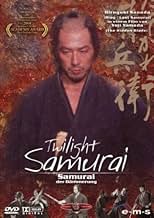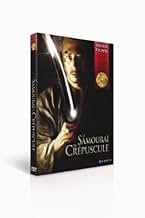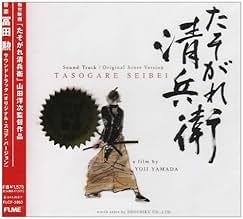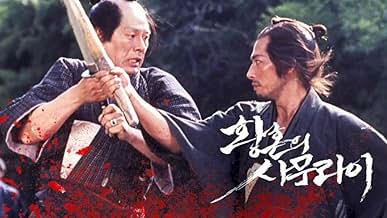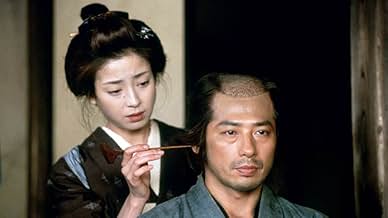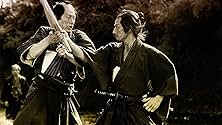Als die Ära des feudalen Japans sich dem Ende zuneigt, hat ein verwitweter Samurai Schwierigkeiten, die Loyalitäten der Clans, zwei junge Töchter, eine betagte Mutter und das plötzliche Wied... Alles lesenAls die Ära des feudalen Japans sich dem Ende zuneigt, hat ein verwitweter Samurai Schwierigkeiten, die Loyalitäten der Clans, zwei junge Töchter, eine betagte Mutter und das plötzliche Wiederauftauchen seiner Jugendliebe auszugleichen.Als die Ära des feudalen Japans sich dem Ende zuneigt, hat ein verwitweter Samurai Schwierigkeiten, die Loyalitäten der Clans, zwei junge Töchter, eine betagte Mutter und das plötzliche Wiederauftauchen seiner Jugendliebe auszugleichen.
- Regie
- Drehbuch
- Hauptbesetzung
- Für 1 Oscar nominiert
- 38 Gewinne & 9 Nominierungen insgesamt
Empfohlene Bewertungen
I've never been much of a fan of samurai movies, or any other kind of movies that glorify the facile wholesale slaughter of other human beings. So this movie was a real breath of fresh air in how it showed the real place that such samurai fighting occupied in that bygone era in Japan.
But the real star of this film is Seibei himself, his daughters, and his love, Tomoe. And their story is so real, so believable, so moving, it was just incredible.
It's a real shame that this title does not seem to be available on video or DVD in the US. This is one title I'd really like to add to my library.
As in much of the cross-fertilization of samurai movies and Westerns such that one can easily imagine a Westernized version, the opening situation recalls "Unforgiven," where a retired gunfighter just wants to be left alone to farm and raise his children and tries to resist pressures to stop putting his fighting skills under a literal grubby basket.
Hiroyuki Sanada gives a superbly nuanced performance as a rebel against the expectations of being the lowest of a high class in a rigidly caste society by embracing the sarcastic titular sobriquet. He is painfully reluctant that he is ever so circuitously revealed to be much more. World weary yet still proud, he gropes for words to explain to his shocked patriarch why he, as an indebted widower, prefers to come home straight from work to see his daughters grow up day by day than follow the family's dictates and anguishes to his best friend about his marriage prospects.
Gradually, surprising people around him are revealed to be as equally complex and frustrated with the roles their society insistently demands even as small step by suffocating step political and social webs inexorably ensnare them tighter and tighter. The flashes of their assertions of their individuality in unexpected moments make for quiet, gripping moments of tension and relief. As his returning childhood friend, Rie Miyazawa has a beautiful, spirited feminity that makes Sanada seem even more of a macho hunk in contrast.
A kind of Jane Austen action flick, it is the kind of movie where antagonists' stares make you hold your breath in suspense and the touch of a hand brings forth your tears.
The translator made a policy decision of just transliterating many traditional Japanese terms, from "sensei" to various styles of sword-fighting, etc. rather than try to find English equivalents. While their meaning can be pretty much inferred from context, it did help that post "Kill Bill" I've been making up for a benighted education that lacked samurai movies and Japanese history.
I found the voice-over narration by the younger daughter a bit schmaltzy and unnecessary. The closing song seemed jarringly period-inappropriate; if it wasn't a Japanese cover of Bob Dylan's "To Make You Feel My Love" then it was a real close imitation with the only clue in English that it was used with permission of EMI.
This is the first of novel adapter/director Yoji Yamada's 77 films that I've seen and I certainly now want to see more.
I don't have a top ten list of all time favorite films but if I did Twilight Samurai would be on it. Nominated for best foreign film the same year that the Hollywood film the last samurai got a few nominations it is impossible not to compare the two. While I enjoyed the Last Samurai and it's message of questioning western cultural imperialism Twilight Samurai is a film on whole different level.
LS is a bloated Hollywood epic that delivers intense battles with huge numbers and a unrealistic unsatisfying bullshit love story. Do we really believe that the woman who lost her husband to Tom Cruise the smelly drunk white would fall in love with him?
Twilight Samurai is the opposite in everyway and in everyway it is a better film that is bound to move to tears the hardest of yall out there. It is the story of a petty samurai who after the long lingering death of his wife finds himself become a devoted father.
When Twilight comes and the other samurai go out to drink, he rushes home to clean the house, tend the field and care for his daughters. He has lost track of his imagine, he smells and all he cares about is what is best for his daughters.
When his childhood crush returns and revolution looms this petty samurai is forced into confronting his status as a samurai. Unlike last samurai the small battle between two samurai's at the end is more emotionally involved that any CGI enhanced battle could ever be. The romance in the film is so sweet, tender and believable that is makes the film special.
This could not be as special as it is without excellent acting, direction and above all writing. Holy crap see this movie.
'Twilight Samurai' is a very sweet film. Sorry, those words, sweet and samurai, may not be used together too much but believe it! With luck, 'The Last Samurai' was just that for Hollywood but please Jollywood bring on more of these.
'Tasogare Seibei' is a story about a low-level Samurai family headed by a widower raising two daughters and his mother who's lapsing into senility. What little action in this film shows how far Seibei (Hiroyuki Sanada) has drifted from his professional prowess. He earns his keep as a scribe and an insect trap maker. When he is called on to defend the honor of his clan, his skill is resurrected although his heart is not in it.
Beautifully filmed and dramatically staged, 'Twilight Samurai' will amuse, dazzle and delight you. Told from the perspective of his daughter reflecting on her life with father, this sentimental tale has the feel of allegory and even novices to this genre will enjoy it. My only criticism is the abrupt ending without a clear resolution. And my lack of Japanese language skills distracted me from this well-acted, set and costumed film.
Just another reason to learn the language.
Seibei (a mesmerising less-is-more turn from Hiroyuki Sanada) is a low-ranking widowed samurai with a senile mother and two daughters, working in the castle's stores and taking in piecework to get by.
Grief at his wife's death has led him to turn his back on violence but he is confronted with it nonetheless, firstly as a result of the return of a childhood friend for whom he has strong feelings and who is fleeing her abusive marriage and, finally, when the politics of the day overtake his clan and he is ordered to carry out an assassination.
Seibei's struggle is not for outward respect but to find integrity within a social order over which he has no influence, making the bursts of violence all the more jarring.
Yamada's film is rightly compared to Kurosawa's work and its thoughtful, lyrical tone and themes resonate powerfully.
Wusstest du schon
- WissenswertesOfficial submission of Japan for the 'Best Foreign Language Film' category of the 76th Academy Awards in 2004.
- PatzerWhile Seibei fighting with Toyotaro, Toyotaro katana fell on the ground, right beside Seibei. Toyotaro fell towards river and Seibei make step forward towards Toyotaro, so the katana clearly should stay behind Seibei, beyond possibility to reach by Toyotaro. But from different camera can be seen that katana lay between both of them, 2 meters ahead of Seibei. It's most likely intentional arrangement by director, otherwise Toyotaro wouldn't be able to made his last attempt to grab katana.
- Zitate
Kayano Iguchi: Father, If I learn to do needlework someday I can make kimonos. But what good will book learning ever do me?
Seibei Iguchi: Well, it probably won't ever be as useful as needlework. But you know, book learning gives you the power to think. However the world might change, if you have the power to think you'll always survive somehow. That's true for boys and for girls. All right?
Kayano Iguchi: Yes.
- VerbindungenFeatured in The 76th Annual Academy Awards (2004)
- SoundtracksKimerareta Rhythm
Performed by Yosui Inoue
Top-Auswahl
- How long is The Twilight Samurai?Powered by Alexa
Details
- Erscheinungsdatum
- Herkunftsland
- Offizielle Standorte
- Sprache
- Auch bekannt als
- The Twilight Samurai
- Drehorte
- Produktionsfirmen
- Weitere beteiligte Unternehmen bei IMDbPro anzeigen
Box Office
- Budget
- 5.000.000 $ (geschätzt)
- Bruttoertrag in den USA und Kanada
- 559.765 $
- Eröffnungswochenende in den USA und in Kanada
- 8.573 $
- 25. Apr. 2004
- Weltweiter Bruttoertrag
- 7.372.769 $
- Laufzeit2 Stunden 9 Minuten
- Farbe
- Sound-Mix
- Seitenverhältnis
- 1.85 : 1
Zu dieser Seite beitragen



